|
|
|
Sort Order |
|
|
|
Items / Page
|
|
|
|
|
|
|
| Srl | Item |
| 1 |
ID:
172575
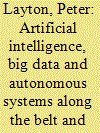

|
|
|
|
|
| Summary/Abstract |
China is pressing ahead with ambitious plans to create a massive infrastructure network connecting it with many countries across the globe. Some of the ‘belt and road’ infrastructure will however, run through regions convulsed by chronic civil unrest, substantial criminality and incipient insurgencies and need protection by China’s private security companies. Simultaneously the Chinese state is undertaking a major ‘anti-secession and counter-terrorism’ campaign in Xinjiang using a variety of high-technology means: artificial intelligence, big data, wireless connectivity, autonomous systems and robotics. The demand and supply sides seem to be in sync, suggesting Chinese private security companies will soon use a suite of advanced information technology systems with a proven employment doctrine across much of Central Asia, South Asia and Africa. Such a future may be plausible but it is by no means certain as various factors may yet thwart China’s private security companies.
|
|
|
|
|
|
|
|
|
|
|
|
|
|
|
|
| 2 |
ID:
188320
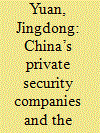

|
|
|
|
|
| Summary/Abstract |
China’s private security companies (PSCs) have become increasingly active actors in meeting the growing demands of Chinese companies operating in high-risk foreign environments for protection and security of both their assets and employees. While growing rapidly in recent decades, Chinese PSCs are relatively new in providing overseas services, remain constrained by lack of well-trained and fully-equipped personnel, and operate under legal uncertainties. Nonetheless, they perform critically important functions in protecting and promoting Chinese security and economic interests abroad. This article provides a preliminary analysis of Chinese PSCs’ introduction to the overseas markets and assesses their performances against opportunities and challenges.
|
|
|
|
|
|
|
|
|
|
|
|
|
|
|
|
| 3 |
ID:
192666
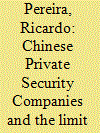

|
|
|
|
|
| Summary/Abstract |
This article analyses how China has overcome the limit of coercion through the use of Private Security Companies since the end of the Cold War until 2021. For this purpose, the Security Governance approach was applied to understand how the decentralisation and fragmentation of the security monopoly by the state could result in convenient coercive acts against societies. We point two paths of observation: an international path – the protection of the Chinese diaspora and the Belt and Road Initiative facilities; and a national path – the governmental interests that pave the monitoring and controlling mechanisms of Chinese society.
|
|
|
|
|
|
|
|
|
|
|
|
|
|
|
|
| 4 |
ID:
145677
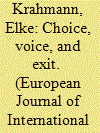

|
|
|
|
|
| Summary/Abstract |
Promoting Private Security Company (PSC) self-regulation has become a key focus due to high profile scandals during the military interventions in Iraq and Afghanistan. Related efforts include the Montreux Document, the International Code of Conduct for Private Security Service Providers (ICoC), American National Standards Institute/ASIS certification, and the new International Standards Organization (ISO) Management System Standard for Private Security Operations. Implicit in industry self-regulation, however, is the assumption that the consumers of private security services will help facilitate and enforce professional standards by shifting their custom to PSCs which have signed up to these codes of conduct or certification schemes. This article investigates the validity of this assumption with regard to government contracting. To what degree are public agencies able – and willing – to let professional standards guide their contracting behaviour? To answer this question, this article develops a general framework for the analysis of public consumer influence through choice, voice, and exit which draws on insights from microeconomics and Albert Hirschman’s classical treatise Exit, Voice, Loyalty. Taking the United States government as an illustrative example, the analysis observes several obstacles to encouraging security industry self-regulation through consumer power.
|
|
|
|
|
|
|
|
|
|
|
|
|
|
|
|
| 5 |
ID:
157103
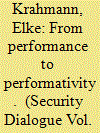

|
|
|
|
|
| Summary/Abstract |
Discussions about the legitimacy of private security companies (PSCs) in multilateral military interventions abound. This article looks at how the United States has sought to legitimize the outsourcing of security services to PSCs through performance-based contracting and performance assessments. Both mechanisms aim to demonstrate the effective provision of publicly desirable outcomes. However, the immaterial and socially constructed nature of security presents major problems for performance assessments in terms of observable and measurable outcomes. Performance has therefore given way to performativity – that is, the repetitive enactment of particular forms of behaviour and capabilities that are simply equated with security as an outcome. The implications of this development for the ways in which security has been conceptualized, implemented and experienced within US interventions have been profound. Ironically, the concern with performance has not encouraged PSCs to pay increased attention to their impacts on security environments and civilian populations, but has fostered a preoccupation with activities and measurable capabilities that can be easily assessed by government auditors.
|
|
|
|
|
|
|
|
|
|
|
|
|
|
|
|
| 6 |
ID:
086350
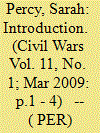

|
|
|
|
|
| Summary/Abstract |
Civil wars are,by their very nature, often characterised by the participation of non-state actors.Because civil wars often occur in situations where the state's authority is weak or non-existent, external actors of all types can play both indirect and direct roles.This special issue seeks to examine these two types of actors combined: What happens when non-state actors external to conflicts paricipate in civil wars?Have new actors of this type appeared on the internationl stage?
|
|
|
|
|
|
|
|
|
|
|
|
|
|
|
|
| 7 |
ID:
141284


|
|
|
|
|
| Summary/Abstract |
This article examines the ethics of using private security companies to undertake combat operations in modern conflict zones. Previous studies on this topic, including those that have drawn on the principles of just war theory, have, out of necessity, been highly speculative because they lacked a strong empirical basis on which to evaluate the behaviour of private security personnel during their operations. Indeed, most scholarship on the ethics of private security companies has relied on a handful of anecdotal examples that happened to receive extensive media coverage. In contrast, this article undertakes the first quantitative analysis of how well the employees of a dozen private security companies adhered to the jus in bello tenets of just war theory and also how their degree of adherence to these tenets affected their tendency to suffer friendly casualties during their security operations in Iraq. It finds that the employees of most of the firms under study exhibited a moderate or high level of adherence to the jus in bello principles of proportionality and discrimination during their security operations in Iraq. Moreover, it also finds that close adherence to these principles did not necessarily expose private security personnel to greater risk of suffering harm.
|
|
|
|
|
|
|
|
|
|
|
|
|
|
|
|
| 8 |
ID:
160619
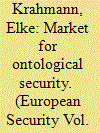

|
|
|
|
|
| Summary/Abstract |
Life in the European Union (EU) has never been as safe as it is today. Nevertheless, EU citizens express widespread anxiety about new risks, such as internal and external migration, transnational crime and terrorism, economic and fiscal uncertainty. One actor which has profited from this development is the security industry. Across Europe there are now nearly as many private security guards employed as public police forces. This article draws on the concept of ontological security to understand the discrepancy between safety and anxiety which underpins the expansion of private security services in Europe. It argues that Private Security Companies (PSCs) are involved in the construction and provision of ontological security through three mechanisms: risk identification, risk profiling and risk management. These mechanisms not only offer physical security, they also reduce existential anxieties by contributing to stable self-identities through personalised risk profiles, commodified lifestyle choices and security routines. Nevertheless, the effects are not only positive. In addition to individualisation and the responsibilization of European citizens for their own physical and ontological security these mechanisms increase societal reliance on commercial expert systems, while reinforcing the perceived failure of the EU as a political and collective security community.
|
|
|
|
|
|
|
|
|
|
|
|
|
|
|
|
| 9 |
ID:
107645
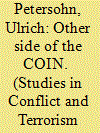

|
|
|
|
|
| Publication |
2011.
|
| Summary/Abstract |
The Iraq War was a watershed regarding the scope of battlefield support by Private Security Companies (PSC). Skeptics soon raised concerns about these new actors being an impediment to the success of the very same operations they are meant to support. According to the critics, PSCs are grist to the mill for insurgents as they employ aggressive tactics and thereby alienate the population, cause credibility problems because they enjoy impunity, and increase coordination problems since they are not subordinated under the military chain of command. This article argues that this is not a necessary result of their employment, but rather the consequence of a lack of preparedness to operate alongside PSCs. However, the military is accustomed to adapting to new unexpected circumstances. Hence, when problems occurred, the armed forces underwent a trial and error learning process that improved PSC employment. The empirical picture supports this view. Initially, the counterinsurgency effort did indeed suffer from the actions, lack of oversight, and lack of coordination of PSCs. However, over the course of the Iraq War, most of the shortfalls were either improved significantly or even resolved.
|
|
|
|
|
|
|
|
|
|
|
|
|
|
|
|
| 10 |
ID:
101000
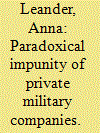

|
|
|
|
|
| Publication |
2010.
|
| Summary/Abstract |
The impunity of private military companies (PMCs) appears increasingly puzzling. Not only is there widespread awareness and public debate about violations of the spirit - if not the letter - of the law; there is also a 'mad scramble' to improve regulation. In spite of this, legal accountability remains problematic. This situation is usually explained either as an expression of the techno-legal difficulties created by the move from government to governance or as reflecting the social, political and economic capital of PMCs. By contrast, this article suggests that the paradox of PMC impunity is best understood by reference to the particular form of authority such organizations enjoy - that is, by reference to their 'symbolic' capital. The article shows that PMC authority is grounded in three interrelated discourses/practices relative to risk/security, market governance and exercise of the state's monopoly on violence. These leave an imprint on the legal accountability sought. The centrality of the risk/security discourse paves the way for exceptionalism; that of the role of market governance for ad-hocism; and that of the discourse of respect for the state's monopoly on violence for inconsequentialism. The result is the coexistence of PMCs' relative impunity with intense contestation and legal innovation.
|
|
|
|
|
|
|
|
|
|
|
|
|
|
|
|
| 11 |
ID:
109824


|
|
|
| 12 |
ID:
114837
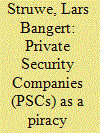

|
|
|
|
|
| Publication |
2012.
|
| Summary/Abstract |
Private Security Companies (PSC) are a part of the Best Management Practice in the shipping industry. The ship owners are using PSCs to protect their vessels against pirates, but protection of the vessels is just a part of the services that PSCs can provide. The services can be divided in four main groups: (1) security intelligence, risk assessment and consulting; (2) security services; (3) crisis response; and (4) intervention. While the use of PSCs may offer some deterrent value, the potential costs of hiring these firms would appear to outweigh the benefits. The argument in this article is that the use of PSCs works for the individual ship owners, but it is not a long term solution of the piracy problem unless they are used in a coordinated way by ship owners and the international society. In this way they can become an added value in the fight against piracy.
|
|
|
|
|
|
|
|
|
|
|
|
|
|
|
|
| 13 |
ID:
086359
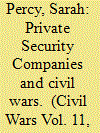

|
|
|
|
|
| Publication |
2009.
|
| Summary/Abstract |
Private security companies (PSCs) have experienced explosive growth since 2001, growth that has been matched only by the consequent explosion in academic attention probing their influence. It is not hard to discover that PSCs and their employees constituted the second-largest member of the US-led Coalition of the Willing during the invasion of Iraq in 2003;1 that this represented a 10-fold increase compared with the first Gulf War in 1991;2 that there are between 15,000 and 50,000 contractors currently operating in Iraq, according to various estimates;3 and that these companies suffer, at the very least, from a dearth of effective regulation4 that some go as far as to call a vacuum.5 However, there has been very little analysis of the consequences of the use of such companies in civil wars. PSCs have the potential, because they are non-state actors, privately motivated, and often external to the conflict, to complicate civil wars. Indeed, the use of PSCs by the US (by far the largest employer of contractors, as PSC employees are often called) has been characterised by a notable absence of planning and policy, both military and governmental. The United Kingdom, which is host to a number of major companies, has similarly failed to examine the policy consequences of the private security industry. This article examines how the absence of effective policy about the effects of privatising force has led to a series of unintended consequences that are influencing and will continue to influence the nature of civil wars. The first section begins by briefly outlining the nature of the private security industry and the roles it plays in civil wars. The second section examines how poor planning has led to problems for the US in its interventions into civil wars, focusing particularly on the private security industry in Iraq. The third section addresses how a similar lack of policy has caused the UK difficulties in the past, and could mean the UK will face problems in conflicts in the future.
|
|
|
|
|
|
|
|
|
|
|
|
|
|
|
|
| 14 |
ID:
087453


|
|
|
|
|
| Publication |
2009.
|
| Summary/Abstract |
The use of contractors employed by private security companies (PSCs) has exploded in recent years, outpacing efforts to assess the consequences of increased reliance on PSCs for international humanitarian law (IHL). This matters both for the states that hire these companies and for the employees of PSCs on or near battlefields. This article examines the legal status of PSCs under the existing IHL framework, focusing on activities where PSC employees carry weapons and how the presence of PSCs in asymmetric conflicts increases the challenge of determining what actions are appropriate within the laws of war. In most cases, PSC employees cannot be accorded combatant status under IHL. However, the actions of private contractors may put their protection as civilians under IHL at risk, and this is particularly true in asymmetric conflicts. I argue that changing the status of PSCs on the battlefield under IHL to take into account the tasks they are performing is not the answer. Rather, bearing IHL in mind, states need to rethink the tasks that PSCs conduct on their behalf, even if this means reducing reliance on PSCs or limiting state military activities. Notably, the USA should re-evaluate its reliance on PSCs to conduct tasks in situations where PSC employees are likely to be pulled into hostilities.
|
|
|
|
|
|
|
|
|
|
|
|
|
|
|
|
| 15 |
ID:
095519
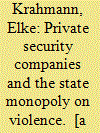

|
|
|
|
|
| Publication |
Frankfurt, PEace Research Institute, 2009.
|
| Description |
34p.
|
| Series |
PRIF report no. 88
|
| Standard Number |
9783937829890, pbk
|
|
|
|
|
|
|
|
|
|
|
|
Copies: C:1/I:0,R:0,Q:0
Circulation
| Accession# | Call# | Current Location | Status | Policy | Location |
| 054946 | 363.289/KRA 054946 | Main | On Shelf | General | |
|
|
|
|
| 16 |
ID:
127806


|
|
|
|
|
| Publication |
2014.
|
| Summary/Abstract |
This article examines the impact of the practices of private security companies (PSCs) upon the fields of security and politics in the Czech Republic. It focuses on the scandalous case of the largest Czech private security company, Agency of the White Lion (ABL)/Mark2 Corporation (M2.C), whose founder attempted to create a business-firm-party by performing a hostile takeover of an existing minor political party. By applying the global security assemblages model and drawing on the recent literature on the commodification of security, this article situates the case of ABL/M2.C within the larger socio-political-legal-economic context of the booming private security industry, whose extensive linkages with Czech politics are best characterized as a 'reverse revolving door' phenomenon. This phenomenon in turn suggests a possibility that the continuing absence of specific legislation to regulate the activities of PSCs is due to too much, rather than too little, political interest in the activities of these organizations. This is problematic because the practices of PSCs have already contributed to a significant rearticulation of the Czech security field by enhancing the commodification of security, while ABL's use of security methods for political purposes has rearticulated the field of politics in a number of profoundly negative ways.
|
|
|
|
|
|
|
|
|
|
|
|
|
|
|
|
| 17 |
ID:
083434
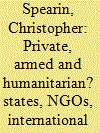

|
|
|
|
|
| Publication |
2008.
|
| Summary/Abstract |
The article contends that, in the light of contemporary challenges, states are not only changing the meaning of the word `humanitarian', but are also creating an expanding marketplace that includes international private security companies (PSCs) in the delivery of humanitarian assistance. Three types of factors - supply, demand, and ideational - have led to this development. On the supply side, state-demanded limitations on the private employment of violence and reduced commercial opportunities in Iraq have called for PSC diversification. On the demand side, states increasingly wish for non-state partners that are comfortable with their involvement in integrated solutions, something that PSCs, rather than nongovernmental organizations (NGOs), are more willing to embrace. On the ideational side, NGOs are concerned that humanitarian endeavour is losing its neutral and impartial status in order to facilitate counterinsurgency, `hearts and minds' activities. PSCs, in contrast, are content with the partial delivery of assistance and likely will continue to be so given, in large part, the experiences of their personnel.
|
|
|
|
|
|
|
|
|
|
|
|
|
|
|
|
| 18 |
ID:
139199


|
|
|
|
|
| Summary/Abstract |
In response to the increasing employment of Privately Contracted Armed Security Personnel (PCASP) to protect vessels against pirate attacks, some flag states introduced new regulations that allow the use of PCASP. The introduction of these new regulations was at least in part an attempt to (re)establish state control of violence. This article provides the background and theoretical framework for this special issue, which discusses how states with national registers approached the regulation of PCASP. Summarizing its major findings, the article concludes that even when states attempted to govern the use of PCASP, operational difficulties resulted in significant shortcomings in state control.
|
|
|
|
|
|
|
|
|
|
|
|
|
|
|
|
| 19 |
ID:
174082


|
|
|
|
|
| Summary/Abstract |
The delegation of authority to private companies in the security domain has certain advantages for states. It optimizes security, lowers costs and eschews accountability. The aim of this article is to examine the implications of the increasing role of private security companies within, at and beyond the borders of state sovereignty. This article argues that the growing power of private security companies in the prevention and the regulation of unauthorized flows of people and goods produces contradictory tendencies for state sovereignty. As private security companies fulfil roles that were previously under the exclusive authority of state actors, states have lost their exclusivity with respect to their coercive and performative roles. Yet, the privatization of security is the result of the calculated decisions of state actors to increase their coercive power against unauthorized border crossers. Even though states’ sovereign exclusivity is being weakened with the privatization of the security domain, both state and private actors work towards strengthening states’ sovereign authority by excluding and deterring unauthorized movements of people and goods.
|
|
|
|
|
|
|
|
|
|
|
|
|
|
|
|
| 20 |
ID:
157787
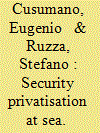

|
|
|
|
|
| Summary/Abstract |
In 2011, the growing number of pirate attacks prompted several flag states to authorise the use of armed guards aboard vessels. Despite facing the same threat, the United Kingdom, the Netherlands and Italy have adopted three distinct approaches to securing their merchant ships, ranging from the exclusive use of private security companies (PSCs) to the employment of military personnel only. This article conducts a congruence testing of the main theoretical explanations for the use of PSCs on land against UK, Dutch and Italian vessel protection policies. By relying on sequencing as a technique for theoretical synthesis, we develop a multicausal explanation of states’ vessel protection arrangements, showing the varying influence of functionalist, ideational, organisational and political drivers of security privatisation at different phases of the policy process.
|
|
|
|
|
|
|
|
|
|
|
|
|
|
|
|
|
|
|
|
|